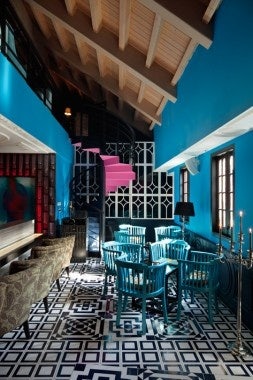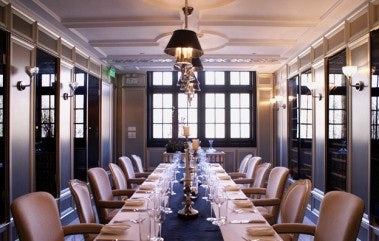"Competition Has Gone From Almost Nothing To Very Serious"#

David Laris (Image: David Laris Creates)
Since arriving in Shanghai nearly a decade ago, Australian chef David Laris has become a fixture in the city's rapidly evolving fine dining scene. Arriving at Three at the Bund in 2002 from London, where he made a name for himself as the head of Sir Terence Conran’s flagship restaurant, Mezzo, Laris led his pioneering Laris Restaurant from 2003-2010, paving the way in terms of building the market for contemporary fine dining in Shanghai. In 2008, he founded David Laris Creates (DLC), which has provided consulting and development services for clients such as Swire's Opposite House (Beijing) and East Hotel (Hong Kong (2010) and Beijing (2012)). Currently, Laris operates seven F&B concepts across 11 locations in Shanghai, including his Yucca Lounge, Mediterranean-infused Fat Olive, and most recently, 12 Chairs -- "one of the smallest fine dining restaurants in China." In October, Laris will open his first Chinese restaurant, Le Sheng (乐笙). Headed by a team of local Shanghainese chefs and featuring a curated list of Chinese teas, Le Sheng will be located on Shanghai's Anfu Lu.
As part of our "Eye on Shanghai" series, Jing Daily editor Avery Booker recently sat down with David Laris at the Fat Olive in Sinan Mansions to discuss Shanghai's evolution as a fine dining destination, the changing tastes of local diners, and the age-old question, "Beijing or Shanghai?"
Jing Daily (JD): Can you say a little about how you ended up in Shanghai?#
David Laris (DL)#
: I’d always said I’d never work in China, never. I’d done Hong Kong and Macau, I’d been in Vietnam. I felt China would be too hard, I’m never gonna work there. (laughs) I’d done the hard stuff. And then this awesome opportunity came up when I was in Singapore attending the World Gourmet Summit, I was cornered there by a team who said, “You’ve got to come to Shanghai to see this building, because it’s going to revolutionize hospitality in China.” I came over and saw what at that time was the skeleton of Three on the Bund, which has, unfortunately, not become the icon it was a few years ago, but certainly for five, six years it reigned supreme about what China could be from an independent hospitality standpoint. I came in and fell in love with the building and got involved at a very early stage. I think, in terms of expats, I was number three or four, and this was a company that ended up having around 30 expats working for it, running Three on the Bund at various levels.
So I got to be part of creating Laris, the fine dining restaurant I did there, and when I set out to do Laris, my ambition was to say that when you set foot in Laris it'll be like you've been transported to a place that could anywhere in the world. And we achieved it, I think, and won awards that no one else has been able to win in this market, from an independent standpoint. And sadly it ran its course, and it’s not so much that the restaurant ran out of life, it’s more that the partnership did. So when I departed there I kind of took a break in terms of what I’d do fine dining-wise, luxury-wise. Before leaving Three on the Bund I'd started the company David Laris Creates, and we got involved with conceptualizing and developing outlets for people like Swire [Hotels], like the Opposite House in Beijing.
Later I noticed gaps in the market, so I did the Fat Olive. Then we opened up Downstairs [at the URBN Hotel] and the Purple Onion. Everything just fell into place, and that led to [the Fat Olive at Sinan Mansions] and 12 Chairs. So I went from having one of the largest fine dining restaurants in the country to one of the smallest (laughs). And it’s given me the opportunity to refocus from the creative chef side, really where I want to position myself again and redevelop new menus and so on, and that’s all with the plan that we’re looking for a new location to do another Laris, maybe 60 seats, 70 seats.
What’s been really interesting is we’ve been getting a lot of Shanghainese who were following what I was doing at Laris, who are saying, "We've come to [the Fat Olive] because we know you’re here," and we’re doing around two and a half thousand [yuan] average check, which is pretty good, by Shanghai standards.

The interior of David Laris's Yucca Lounge
JD: Talking about gaps in the market, your restaurants here are pretty diverse in terms of focus. Are you just following your muse, or what is it that makes you say, I want to open this kind of restaurant or that kind of restaurant?#
DL#
: It’s a combination of a few things, I think partly I do follow my muse. I feel like I want to do something, like I want to do cool, funky Greek food, or maybe someone’s doing something similar and I'll say, "I wanna create my version." There's that component of it. But other times it's based on the space. Then there's the strategic side, where it's strategically part of my brand and my DNA. I want to be cooking as a chef at the highest level that I can, so that's why we'll create something like 12 Chairs. The other stuff is really run by other passions, never by the numbers completely. Other people do that, but I wanna have a combination of, yes, it has to make money, but I want to find things that enrich the environment from a hospitality standpoint. When I originally got here, product-wise and industry-wise there was almost nothing here, there wasn’t even that competition you have between chefs when a city starts to mature. We have that now between chefs and restaurateurs -- it even gets a bit bitchy sometimes -- but I think that’s what a healthy industry needs to have, that push and pull, that energy.
I wanted to be part of shaping that industry, at least in my area, being more on the Western side, with a certain approach and intelligence in the way we look at hospitality and service and integrity and food. Deep down I hate to be boxed in, you know, I don’t want to be defined as "the fine dining guy," and I think sometimes that’s worked against me, because people say, "how can you do Laris, and then do this Fat Olive thing?" But in other parts of the world, chefs are doing it. It’s just that it hasn’t be done here, and everybody, particularly in Asia, loves to put people in categories, it just makes it easy.
JD: Like “Western” food.#
DL#
: (laughs) Or fusion, just because they put some coriander in it. So I wanted to constantly be a part of challenging those norms. And honestly, you feel [Shanghai] change. I mean, that’s the great thing about China. You can feel it change in front of you. If you stay focused and determined on what’s in front of you, you may get a little crap sometimes and people wanna have a bit of a go or whatever, but if you stick to it and there’s real integrity, it’ll stick, and then you see it start to mature, and out of this eight, nine years, it’s been quite cool to watch it and then watch other people rise as well.
JD: I’m curious about that evolution of the actual market, because your main focus has been in Shanghai, so being so close on the ground here, what would you say has been the biggest change here in terms of diners, also in terms of competition?#
DL#
: Honestly, competition has gone from almost nothing, to actually, I would say now, to very serious competition coming. And I’m excited by competition, on all levels, whether it be the high-end fine dining -- it’s great, because it elevates the city to a standard where we can be proud we’re competing, and anytime we can compete globally it’s exciting for us -- but it’s not just on that level we’ve seen it mature, because it hasn’t fully matured on that high-end yet. There’s a lot of people doing fine dining, or high-end and it just doesn’t have the integrity and discipline that it takes to make it to that level. But on the mid-range market, I think we’re seeing a tremendous amount of great products popping up, people who are doing well-conceived, good designs that could fit into any major city in the world. We’ve seen a lot more healthy competition, especially across the Mediterranean-French genre, and there’s a lot of other great things like Baker & Spice. It’s great to see this level of intelligence creeping in, and we’re getting more access to products, so I can only say that the landscape is so different. There was nothing, and now there’s loads.
The other trend that we see is the diner itself. Now that the diner has all this choice, here you can see it actually evolve. If we talk about the China market first, which is one that everyone finds really interesting, there’s more and more middle class coming out to try the Western experience, saying, "I’m going out to dinner tonight, I’m gonna try Greek, or Italian," whereas before they might’ve said “I’m gonna try Western” and just go to any generic western restaurant. I think the initial entry level a few years ago would’ve been Pizza Hut, but now they’re engaged with it the way it should be done.
One thing I’ve never believed in doing is dumbing it down for the local market. I think that’s, at its core, distasteful to me. If you’re talking about doing an Italian concept, do an Italian concept. If you want to do a Spanish concept, have the ibérico hams, have the real deal, because the market will gravitate towards it. I think the Chinese market is looking for personality, they like good design, they like good quality products and they’re not afraid to spend up. And I’ll always test that out, I’ll put a great piece of beef on the menu and it’ll sell. I’ll put on a whole snapper and it’ll sell, because the perception and the fact is that it’s good. So we’ve seen more willingness to spend in the western market. And there’s a few more things happening on the periphery, where there’s a real interest in reading and learning about wine pairing and wine tasting, so that’s only helping us. So in my restaurants I’m seeing an ever-increasing number of Chinese middle-class and upper-middle class eating at my restaurants and knowing who I am and what my brand is.
JD: How about on the Westerner side?#
DL#
: On the western side, that kind of big-budget, expat on expense thing isn’t quite what it was. I think the recession kinda snapped everything back into reality. That profile of customer is still here, perhaps, but we did see a sort of replacement with the upper-middle-class Chinese, who were there to step in and start appreciating fine dining.
One thing I do comment on often is that the market isn’t as mature as people like to make out, in terms of hospitality. It’s still a hard gig. The anticipated demand for the F&B industry and the level of high-end in particular that’s here is not equal to the amount of spending power that’s required to sustain all of those products. Another reason I’m being cautious before I open the next massive fine dining restaurant is because I want to see how it settles down this year in particular. I’d rather do a series of smaller things and be able to control them. Because if you look at the Hong Kong market, for example, and you look at the average spending you can get on wine and food for a Hong Kong restaurant, in Shanghai the rentals and staff costs we’re paying have gone up quite a lot in the last 10 years, but we haven’t hit the same numbers that someone may hit in a Hong Kong restaurant. When it catches up [in terms of spending] it’s gonna be golden, but it’s not there yet. Still, there’s this perception that you can come here and kinda tap into the China market and instantly everyone’s spending two thousand a head. But it isn’t the reality.

Laris's newest (and smallest) restaurant, 12 Chairs
JD: I don’t think that’s unique to food and beverage at all, I think you see that in the luxury business as well.#
DL#
: True. The market isn’t mature enough for all of those guys to do well, so they’ve gotta be investing in long-term. And especially with luxury, the more boutique luxury [brands] have a harder time ahead of them, because the appreciation of more boutique luxury isn’t quite here yet, If you go to Gucci in Beijing on a Sunday, it’s like you’re in Tesco’s or something (laughs). But then you might go to a boutique luxury brand, which may be of better quality, yet it isn’t as followed yet.
JD: So I’m a bit curious how that analogy works for your restaurants, because they do range in size, from larger to smaller. Now that you do have a personal brand here, what tends to be the ‘entry-level’ restaurant here that locals head to first?#
DL#
: They’d probably come to something like Fat Olive or they’d come for something like Downstairs. We find that seems to be something that’s very much approachable and accessible, and I think they’re the first ones for the larger market, let’s say that. Purple Onion’s a bit more boutique, and we’ve only recently started to find an increase in Chinese customers, because it got a bit of a rap on Weibo. But it is so unique that I don’t think the Chinese market could immediately put it into a category and go, "is this what Mediterranean is supposed to be like?" I think that’s starting to change, as well. Definitely at the Fat Olive, though, people will walk in and go, "ah, this is cool, I’m comfortable here," and that’s the very essence of capturing the Chinese market.
They have to walk in and feel, I get this, I can be here. Same with Downstairs -- they get the food, they get the vibe, it’s not pretentious, it’s not trying to be. It’s easily translated to Chinese and the staff are trained to kind of bring it to the people. So I find those two brands are the ones that jump up at the top.
JD: Do you try to communicate to customers that there are other restaurants and suggest they try them?#
DL#
: Oh, sure. Subtly, and sometimes not so subtly (laughs). In our office, we make sure that when there are alignments that we’re able to cross-pollinate. At the same time, I’m a believer in keeping them all unique. I want each GM and each chef to feel like they’re working with me in such a way that we are creating for them their environment and they take ownership of it.
But when we can do brand alignment across the entire group, hopefully whatever the concept is, if it’s got an umbrella over it, [the key is] that it’s at a certain level in terms of quality, food and service.
Come back tomorrow#
for the second part of our exclusive interview#
with David Laris, covering his attention to detail and design, dealing with critics, and the Beijing vs. Shanghai culinary rivalry.